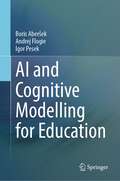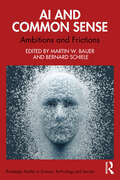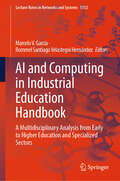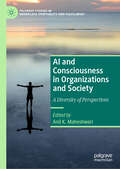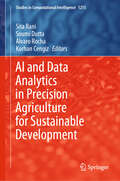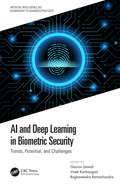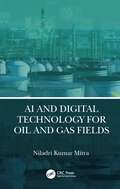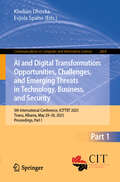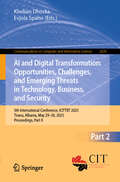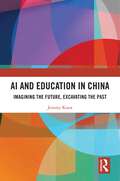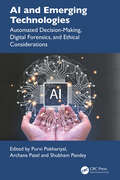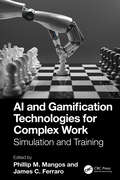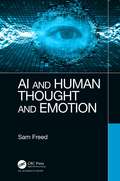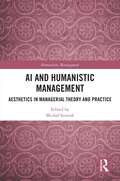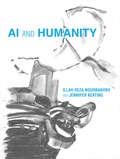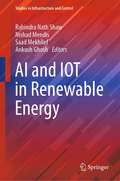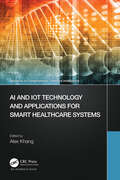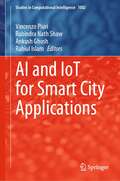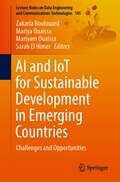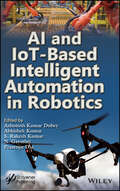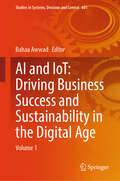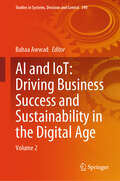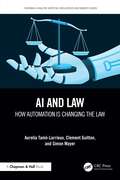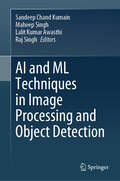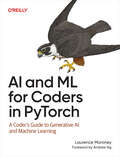- Table View
- List View
AI and Cognitive Modelling for Education
by Boris Aberšek Andrej Flogie Igor PesekThis book offers a groundbreaking approach to bridging the gap between various disciplines involved in cognitive modeling in education. By drawing on the fields of learning, neuro science, cognitive science, neurobiology, and computer science, it provides a new perspective on how we can integrate these disciplines with education to create more effective learning environments. The main objective of this book is to delve into the ethical, sociological, and technological questions surrounding the introduction of intelligent and smart learning environments in education. By analyzing these issues, this book aims to bridge the gap between the various disciplines involved in cognitive modeling and education, while highlighting the benefits and risks associated with these advancements. With the emergence of AI-based tutors, coaches, and learning environments, students now have access to a new type of self-learning and self-training that was previously unavailable. Distance learning has become increasingly popular in recent years, and the use of computer-assisted learning tools has revolutionized the way we think about education. The goal of education must be to instill in students a desire to learn for themselves, and this can only be achieved through active, self-directed, and reflective learning. With intelligent tutoring systems, students are empowered to take an active role in their own education, rather than simply being passive recipients of information. This book offers practical strategies for teachers to facilitate this transition, enabling them to act as facilitators and guides rather than one-way communicators. By embracing this new approach to education, we can help students become lifelong learners who are equipped with the skills they need to succeed in the 21st century. As we cannot predict the future with certainty, the true effects of education may only be revealed in the long run, making it critical to understand the potential consequences of introducing these new learning tools. By exploring these complex topics, this book offers valuable insights for educators, policymakers, and anyone interested in the future of education.
AI and Common Sense: Ambitions and Frictions (Routledge Studies in Science, Technology and Society)
by Martin W. Bauer and Bernard SchieleCommon sense is the endless frontier in the development of artificial intelligence, but what exactly is common sense, can we replicate it in algorithmic form, and if we can – should we?Bauer, Schiele and their contributors from a range of disciplines analyse the nature of common sense, and the consequent challenges of incorporating into artificial intelligence models. They look at different ways we might understand common sense and which of these ways are simulated within computer algorithms. These include sensory integration, self-evident truths, rhetorical common places, and mutuality and intentionality of actors within a moral community. How far are these possible features within and of machines? Approaching from a range of perspectives including Sociology, Political Science, Media and Culture, Psychology and Computer Science, the contributors lay out key questions, practical challenges and "common sense" concerns underlying the incorporation of common sense within machine learning algorithms for simulating intelligence, socialising robots, self-driving vehicles, personnel selection, reading, automatic text analysis, and text production.A valuable resource for students and scholars of Science–Technology–Society Studies, Sociologists, Psychologists, Media and Culture Studies, human–computer interaction with an interest in the post-human, and programmers tackling the contextual questions of machine learning.
AI and Computing in Industrial Education Handbook: A Multidisciplinary Analysis from Early to Higher Education and Specialized Sectors (Lecture Notes in Networks and Systems #1512)
by Marcelo V. Garcia Rommel Santiago Velastegui HernándezThis book bridges Industry 4.0 principles with educational innovation, offering groundbreaking approaches that transform learning environments across diverse contexts. Readers discover practical applications ranging from AI-powered diagnostics to gamification strategies, all designed to make education more accessible, engaging, and effective.The unique collaboration between Hispanic American and European researchers brings fresh perspectives to educational technology, organizing cutting-edge research into six comprehensive sections. What distinguishes this work is its human-centered approach—each technological advancement connects directly to pedagogical improvement.Educators, researchers, and technology specialists find value in the book&’s exploration of solutions like holographic displays, 3D-printed prosthetics for STEM education, and psychological self-assessment platforms. Beyond serving as a reference, this book establishes a foundation for continued cross-cultural dialogue and future innovation, helping institutions integrate emerging technologies while keeping human development at the core of educational transformation.
AI and Consciousness in Organizations and Society: A Diversity of Perspectives (Palgrave Studies in Workplace Spirituality and Fulfillment)
by Anil K. MaheshwariThis volume investigates the intricate interplay between artificial intelligence (AI) and consciousness, delving into potential convergences and divergences in organizational and societal contexts. It adopts various perspectives, including spirituality, humanism, sustainability, and systems thinking. Organized into three sections, the work explores consciousness-based, humanistic, and systemic approaches, covering topics such generative AI, creativity, innovation, and religious traditions.AI encapsulates human reality and knowledge in a functional, accessible form, while consciousness is the timeless totality of universal reality in its unbounded unmanifest potential accessible through natural practices. The two are complementary, though with disagreement on primacy of one or the other. Exploring the broad impact of AI on spirituality, this interdisciplinary book will engage scholars and students in the fields of management, DEI, psychology, and philosophy.
AI and Data Analytics in Precision Agriculture for Sustainable Development (Studies in Computational Intelligence #1215)
by Álvaro Rocha Soumi Dutta Korhan Cengiz Sita RaniThis book offers a comprehensive analysis of artificial intelligence (AI) and data analytics in precision agriculture. The integration of technology in agriculture is revolutionizing traditional farming practices, paving the way for sustainability. Precision farming, powered by AI, IoT, and big data, optimizes resource use by enabling real-time monitoring of soil health, weather conditions, and crop growth. Automated irrigation systems and drones reduce water wastage and enhance productivity. Biotechnology advances, such as genetically modified crops and CRISPR gene editing, improve yield, pest resistance, and climate adaptability. Vertical farming and hydroponics offer space-efficient solutions, minimizing land degradation and water consumption. Robotics and autonomous machinery streamline labor-intensive tasks, reducing reliance on chemical inputs. Blockchain ensures transparency in the food supply chain, promoting fair trade and reducing food fraud. Renewable energy sources, like solar-powered farms, further lower agriculture&’s carbon footprint. By adopting these innovations, farmers can produce more with fewer resources, ensuring food security while preserving the environment. Embracing technology-driven agriculture is crucial for meeting global food demands sustainably, combating climate change, and fostering economic resilience in farming communities. The future of agriculture lies in intelligent, data-driven, and eco-friendly solutions that balance productivity with environmental stewardship.
AI and Deep Learning in Biometric Security: Trends, Potential, and Challenges (Artificial Intelligence (AI): Elementary to Advanced Practices)
by Gaurav Jaswal Vivek KanhangadThis book provides an in-depth overview of artificial intelligence and deep learning approaches with case studies to solve problems associated with biometric security such as authentication, indexing, template protection, spoofing attack detection, ROI detection, gender classification etc. This text highlights a showcase of cutting-edge research on the use of convolution neural networks, autoencoders, recurrent convolutional neural networks in face, hand, iris, gait, fingerprint, vein, and medical biometric traits. It also provides a step-by-step guide to understanding deep learning concepts for biometrics authentication approaches and presents an analysis of biometric images under various environmental conditions. This book is sure to catch the attention of scholars, researchers, practitioners, and technology aspirants who are willing to research in the field of AI and biometric security.
AI and Digital Technology for Oil and Gas Fields
by Niladri Kumar MitraThe book essentially covers the growing role of AI in the oil and gas industry, including digital technologies used in the exploration phase, customer sales service, and cloud-based digital storage of reservoir simulation data for modeling. It starts with the description of AI systems and their roles within the oil and gas industry, including the agent-based system, the impact of industrial IoT on business models, and the ethics of robotics in AI implementation. It discusses incorporating AI into operations, leading to the reduction of operating costs by localizing control functions, remote monitoring, and supervision.Features of this book are given as follows: It is an exclusive title on the application of AI and digital technology in the oil and gas industry It explains cloud data management in reservoir simulation It discusses intelligent oil and gas well completion in detail It covers marketing aspects of oil and gas business during the exploration phase It reviews development of digital systems for business purposes This book is aimed at professionals in petroleum and chemical engineering, technology, and engineering management.
AI and Digital Transformation: 5th International Conference, ICITTBT 2025, Tirana, Albania, May 29–30, 2025, Proceedings, Part I (Communications in Computer and Information Science #2669)
by Evjola Spaho Klodian DhoskaThis two-set volume CCIS 2669 and CCIS 2670 constitutes the post-conference proceedings of the 5th International Conference on AI and Digital Transformation: Opportunities, Challenges, and Emerging Threats in Technology, Business, and Security, ICITTBT 2025 held in Tirana, Albania during May 29-30, 2025. The 65 full papers and 26 short papers presented in this volume were carefully reviewed and selected from 219 submissions. They were organized in the following topical sections: Part I: Artificial Intelligence (AI); Data Analytics and Data Science; Advancements in IoT, Networking, Cloud, Robotics, and Cybersecurity. Part II: Technology in Applied Sciences; Management, Business, Economics, and Social Sciences: Analytics, Strategy, and Governance; Digital Economy.
AI and Digital Transformation: 5th International Conference, ICITTBT 2025, Tirana, Albania, May 29–30, 2025, Proceedings, Part II (Communications in Computer and Information Science #2670)
by Evjola Spaho Klodian DhoskaThis two-set volume CCIS 2669 and CCIS 2670 constitutes the post-conference proceedings of the 5th International Conference on AI and Digital Transformation: Opportunities, Challenges, and Emerging Threats in Technology, Business, and Security, ICITTBT 2025 held in Tirana, Albania during May 29-30, 2025. The 65 full papers and 26 short papers presented in this volume were carefully reviewed and selected from 219 submissions. They were organized in the following topical sections: Part I: Artificial Intelligence (AI); Data Analytics and Data Science; Advancements in IoT, Networking, Cloud, Robotics, and Cybersecurity. Part II: Technology in Applied Sciences; Management, Business, Economics, and Social Sciences: Analytics, Strategy, and Governance; Digital Economy.
AI and Education in China: Imagining the Future, Excavating the Past
by Jeremy KnoxThis book explores the relationships between artificial intelligence (AI) and education in China. It examines educational activity in the context of profound technological interventions, far-reaching national policy, and multifaceted cultural settings. By standing at the intersection of three foundational topics – AI and the recent proliferation of data-driven technologies; education, the most foundational of our social institutions in terms of actively shaping societies and individuals; and, finally, China, which is a frequent subject for dramatic media reports about both technology and education – this book offers an insightful view of the contexts that underpin the use of AI in education, and promotes a more in-depth understanding of China. Scholars of educational technology and digital education will find this book an indispensable guide to the ways new technologies are imagined to transform the future, while being firmly grounded in the past.
AI and Emerging Technologies: Automated Decision-Making, Digital Forensics, and Ethical Considerations
by Archana Patel Purvi Pokhariyal Shubham PandeyIn the past decade, Artificial Intelligence (AI) has made significant advancements in various sectors of society, such as education, health, e-commerce, media and entertainment, banking and finance, transportation, and defense, among others. Its application has permeated every sector, leaving no area untouched. However, the utilization of AI brings forth crucial legal, ethical, and technical concerns and obstacles that must be appropriately addressed through thoughtful deliberation, discussions, and the implementation of effective regulations.AI and Emerging Technologies: Automated Decision-Making, Digital Forensics, and Ethical Considerations provides a comprehensive and insightful roadmap for exploring the advancements, challenges, solutions, and implications of AI in three key areas: the legal field, gaming applications, digital forensic, and decision-making. By delving into these topics, this book offers a deep understanding of how AI can be optimally utilized to deliver maximum benefits to users, all within a single, comprehensive source. One of the focuses of this book is to shed light on the preictal application of emerging technologies in automated decision-making while also addressing the ethical considerations that arise from their use. By examining the integration of these technologies into digital forensics and their impact on other domains, such as gaming applications deep fake, this book presents valuable insights into the broader implications of AI.The book serves as an invaluable resource for anyone seeking to understand and navigate the complex world of AI. By offering a comprehensive exploration of its applications, ethical considerations, and data protection techniques, it provides researchers and scholars, graduate students, software engineers along with data scientists the necessary insights to harness the full potential of AI while ensuring its responsible and ethical use.
AI and Gamification Technologies for Complex Work
by James C. FerraroThe medium through which training in the workplace is delivered has been changing in recent years to offer a more personalized and immersive experience. The invention of virtual reality (VR) and augmented reality (AR) platforms has created opportunities to take a more hands-on approach to familiarizing oneself with a task or environment with mitigated time and monetary commitments. Written assessments are being swiftly replaced with more interactive and scientifically validated training simulations and this essential technology is in high demand in the government and private sectors. This book highlights many of the ways simulation-based training can be leveraged to create personalized training curricula for those in high-risk careers and how it can be assessed successfully. AI and Gamification Technologies for Complex Work uncovers the use of artificial intelligence (AI) and machine learning (ML) for the purposes of creating adaptive, personalized training for individuals who work in complex jobs. It covers adaptive simulation-based training, fighting skill decay through game-based training, and additional uses of AI/ML and other tools in measuring human performance. Insights from professionals and experts in the fields of simulation and training provide readers with information about current applications of AI/ML in creating adaptive or personalized training, as well as investigations into the future of simulation and game-based training, as virtual and augmented realities proliferate modern training programs. The book looks at how data science, AI, and ML contribute to adaptive training systems and the reader is encouraged to look further into the engines that drive adaptive training while devising their own systems for training in complex jobs. This book is ideal for professionals in human factors engineering and psychology, artificial intelligence, military training and simulation, game development, data science, modeling and simulation and industrial and organizational psychology.
AI and Human Thought and Emotion
by Sam FreedThe field of artificial intelligence (AI) has grown dramatically in recent decades from niche expert systems to the current myriad of deep machine learning applications that include personal assistants, natural-language interfaces, and medical, financial, and traffic management systems. This boom in AI engineering masks the fact that all current AI systems are based on two fundamental ideas: mathematics (logic and statistics, from the 19th century), and a grossly simplified understanding of biology (mainly neurons, as understood in 1943). This book explores other fundamental ideas that have the potential to make AI more anthropomorphic. Most books on AI are technical and do not consider the humanities. Most books in the humanities treat technology in a similar manner. AI and Human Thought and Emotion, however is about AI, how academics, researchers, scientists, and practitioners came to think about AI the way they do, and how they can think about it afresh with a humanities-based perspective. The book walks a middle line to share insights between the humanities and technology. It starts with philosophy and the history of ideas and goes all the way to usable algorithms. Central to this work are the concepts of introspection, which is how consciousness is viewed, and consciousness, which is accessible to humans as they reflect on their own experience. The main argument of this book is that AI based on introspection and emotion can produce more human-like AI. To discover the connections among emotion, introspection, and AI, the book travels far from technology into the humanities and then returns with concrete examples of new algorithms. At times philosophical, historical, and technical, this exploration of human emotion and thinking poses questions and provides answers about the future of AI.
AI and Humanistic Management: Aesthetics in Managerial Theory and Practice (Humanistic Management)
by Michal SzostakThis book, situated at the intersection of humanistic management, aesthetics, and artificial intelligence (AI) studies, aims to explore how the emergence of AI-driven solutions reshapes managerial paradigms, alters human experiences within organisations, and redefines the values guiding leadership, communication, and organisational development. By adopting a cross-disciplinary and multi-paradigmatic perspective, the volume seeks not only to identify the opportunities AI presents for enhancing human dignity and creativity at work but also to critically examine the risks of dehumanisation, aesthetic homogenisation, and ethical displacement. In the contemporary discourse on management theory and practice, the accelerated integration of AI technologies has initiated profound transformations that challenge the traditional humanistic foundations of organisational life. While AI is often perceived primarily through the lens of operational efficiency, cost optimisation, and decision-making enhancement, it also raises fundamental questions about the aesthetic, ethical, and relational dimensions of management. In this context, the book’s critical research problem was formulated in the following manner: understanding how AI-driven aesthetics influence the humanistic character of management, under what conditions AI can serve human-centred goals rather than eroding them, and what long-term consequences AI integration may have for the emotional, ethical, and aesthetic dimensions of organisational life. Addressing these issues is essential for developing management practices that harmonise technological advancement with the humanistic values of autonomy, authenticity, empathy, and aesthetic experience.
AI and Humanity (The\mit Press Ser.)
by Illah Reza Nourbakhsh Jennifer KeatingAn examination of the implications for society of rapidly advancing artificial intelligence systems, combining a humanities perspective with technical analysis; includes exercises and discussion questions.AI and Humanity provides an analytical framing and a common language for understanding the effects of technological advances in artificial intelligence on society. Coauthored by a computer scientist and a scholar of literature and cultural studies, it is unique in combining a humanities perspective with technical analysis, using the tools of literary explication to examine the societal impact of AI systems. It explores the historical development of these technologies, moving from the apparently benign Roomba to the considerably more sinister semi-autonomous weapon system Harpy. The book is driven by an exploration of the cultural and etymological roots of a series of keywords relevant to both AI and society. Works examined range from Narrative of the Life of Frederick Douglass, given a close reading for its themes of literacy and agency, to Simon Head's critique of the effects of surveillance and automation on the Amazon labor force in Mindless.Originally developed as a textbook for an interdisciplinary humanities-science course at Carnegie Mellon, AI & Humanity offers discussion questions, exercises (including journal writing and concept mapping), and reading lists. A companion website provides updated resources and a portal to a video archive of interviews with AI scientists, sociologists, literary theorists, and others.
AI and IOT in Renewable Energy (Studies in Infrastructure and Control)
by Saad Mekhilef Ankush Ghosh Rabindra Nath Shaw Nishad MendisThis book presents the latest research on applications of artificial intelligence and the Internet of Things in renewable energy systems. Advanced renewable energy systems must necessarily involve the latest technology like artificial intelligence and Internet of Things to develop low cost, smart and efficient solutions. Intelligence allows the system to optimize the power, thereby making it a power efficient system; whereas, Internet of Things makes the system independent of wire and flexibility in operation. As a result, intelligent and IOT paradigms are finding increasing applications in the study of renewable energy systems. This book presents advanced applications of artificial intelligence and the internet of things in renewable energy systems development. It covers such topics as solar energy systems, electric vehicles etc. In all these areas applications of artificial intelligence methods such as artificial neural networks, genetic algorithms, fuzzy logic and a combination of the above, called hybrid systems, are included. The book is intended for a wide audience ranging from the undergraduate level up to the research academic and industrial communities engaged in the study and performance prediction of renewable energy systems.
AI and IoT Technology and Applications for Smart Healthcare Systems (Advances in Computational Collective Intelligence)
by Alex KhangIn recent years, the application of Artificial Intelligence (AI) and Internet of Things (IoT) technologies in smart healthcare has been increasing. We are approaching a world where connected smart devices tell people when they need to visit a doctor because these devices will be able to detect health problems and discover symptoms of illness that may need medical care. AI-collaborative IoT technologies can help medical professionals with decision-making. These technologies can also help develop a sustainable and smart healthcare system.AI and IoT Technology and Applications for Smart Healthcare Systems helps readers understand complex scientific topics in a simple and accessible way. It introduces the world of AI-collaborative IoT physics, explaining how this technology behaves at the smallest level and how this can revolutionize healthcare. The book shows how IoT technology and AI can work together to make computers more powerful and capable of solving complex problems in the healthcare sector. Exploring the effect of AI-collaborative technology on IoT technologies, the book discusses how IoT can benefit from AI algorithms to enable machines to learn, make decisions, and process information more efficiently. Because smart machines create more perceptive devices and systems, the application of this technology raises important ethical questions about privacy, security, and the responsible development of healthcare IoT technology, which this book covers. The book also provides insight into the potential applications of these technologies not only in the healthcare industry but also in related fields, such as smart transportation, smart manufacturing, and smart cities.
AI and IoT for Smart City Applications (Studies in Computational Intelligence #1002)
by Vincenzo Piuri Rabiul Islam Ankush Ghosh Rabindra Nath ShawThis book provides a valuable combination of relevant research works on developing smart city ecosystem from the artificial intelligence (AI) and Internet of things (IoT) perspective. The technical research works presented here are focused on a number of aspects of smart cities: smart mobility, smart living, smart environment, smart citizens, smart government, and smart waste management systems as well as related technologies and concepts. This edited book offers critical insight to the key underlying research themes within smart cities, highlighting the limitations of current developments and potential future directions.
AI and IoT for Sustainable Development in Emerging Countries: Challenges and Opportunities (Lecture Notes on Data Engineering and Communications Technologies #105)
by Mariya Ouaissa Zakaria Boulouard Mariyam Ouaissa Sarah El HimerThis book comprises a number of state-of-the-art contributions from both scientists and practitioners working in a large pool of fields where AI and IoT can open up new horizons. Artificial intelligence and Internet of Things have introduced themselves today as must-have technologies in almost every sector. Ranging from agriculture to industry and health care, the scope of applications of AI and IoT is as wide as the horizon. Nowadays, these technologies are extensively used in developed countries, but they are still at an early stage in emerging countries. AI and IoT for Sustainable Development in Emerging Countries—Challenges and Opportunities is an invaluable source to dive into the latest applications of AI and IoT and how they have been used by researchers from emerging countries to solve sustainable development-related issues by taking into consideration the specifities of their countries. This book starts by presenting how AI and IoT can tackle the challenges of sustainable development in general and then focuses on the following axes: · AI and IoT for smart environment and energy · Industry 4.0 and intelligent transportation · A vision towards an artificial intelligence of medical things · AI, social media, and big data analytics. It aspires to provide a relevant reference for students, researchers, engineers, and professionals working in these particular areas or those interested in grasping its diverse facets and exploring the latest advances on their respective fields and the role of AI and IoT in them.
AI and IoT-Based Intelligent Automation in Robotics
by Abhishek Kumar Ashutosh Kumar Dubey N. Gayathri S. Rakesh Kumar Prasenjit DasThe 24 chapters in this book provides a deep overview of robotics and the application of AI and IoT in robotics. It contains the exploration of AI and IoT based intelligent automation in robotics. The various algorithms and frameworks for robotics based on AI and IoT are presented, analyzed, and discussed. This book also provides insights on application of robotics in education, healthcare, defense and many other fields which utilize IoT and AI. It also introduces the idea of smart cities using robotics.
AI and IoT: Volume 1 (Studies in Systems, Decision and Control #601)
by Bahaa AwwadThis book explores the integration of AI technologies with emerging trends such as IoT, blockchain, and cloud computing. In this book readers will embark on a transformative journey that explores the powerful convergence of Artificial Intelligence (AI), Internet of Things (IoT), and business management. With the advent of these cutting-edge technologies, businesses have unprecedented opportunities to revolutionize their operations, drive innovation, and achieve remarkable success in today's digital landscape.
AI and IoT: Volume 2 (Studies in Systems, Decision and Control #590)
by Bahaa AwwadThis book embarks on a transformative journey that explores the powerful convergence of artificial intelligence (AI), Internet of Things (IoT), and business management. With the advent of these cutting-edge technologies, businesses have unprecedented opportunities to revolutionize their operations, drive innovation, and achieve remarkable success in today's digital landscape.
AI and Law: How Automation is Changing the Law (Chapman & Hall/CRC Artificial Intelligence and Robotics Series)
by Aurelia Tamo-Larrieux Clement Guitton Simon MayerThis book provides insights into how AI is changing legal practice, government processes, and individuals’ access to those processes, encouraging each of us to consider how technological advances are changing the legal system. Particularly, and distinct from current debates on how to regulate AI, this books focuses on how the progressive merger between computational methods and legal rules changes the very structure and application of the law itself.We investigate how automation is changing the legal analysis, legal rulemaking, legal rule extraction, and application of legal rules and how this impacts individuals, policymakers, civil servants, and society at large. We show through many examples that a debate on how automation is changing the law is needed, which must revolve around the democratic legitimacy of the automation of legal processes, and be informed by the technical feasibility and tradeoffs of specific endeavors.
AI and ML Techniques in Image Processing and Object Detection
by Lalit Kumar Awasthi Maheep Singh Raj Singh Sandeep Chand KumainThis book highlights the evolution and interdisciplinary approach of AI and ML in image processing, tracing historical development and exploring their convergence with different fields. It delves into optimizing neural architectures and making deep learning models interpretable while exploring recent trends like versatile CNN applications and edge computing deployment. The intersection of AI and creativity, dynamic transfer learning, and domain adaptation are discussed alongside object detection techniques and reinforcement learning. It examines advanced applications in satellite imagery, healthcare, and smart cities, addressing ethical considerations like bias mitigation and transparency. This book also outlines future trends such as quantum-inspired computing and the evolution of edge AI ecosystems.
AI and ML for Coders in PyTorch
by Laurence MoroneyEager to learn AI and machine learning but unsure where to start? Laurence Moroney's hands-on, code-first guide demystifies complex AI concepts without relying on advanced mathematics. Designed for programmers, it focuses on practical applications using PyTorch, helping you build real-world models without feeling overwhelmed.From computer vision and natural language processing (NLP) to generative AI with Hugging Face Transformers, this book equips you with the skills most in demand for AI development today. You'll also learn how to deploy your models across the web and cloud confidently.Gain the confidence to apply AI without needing advanced math or theory expertiseDiscover how to build AI models for computer vision, NLP, and sequence modeling with PyTorchLearn generative AI techniques with Hugging Face Diffusers and Transformers
